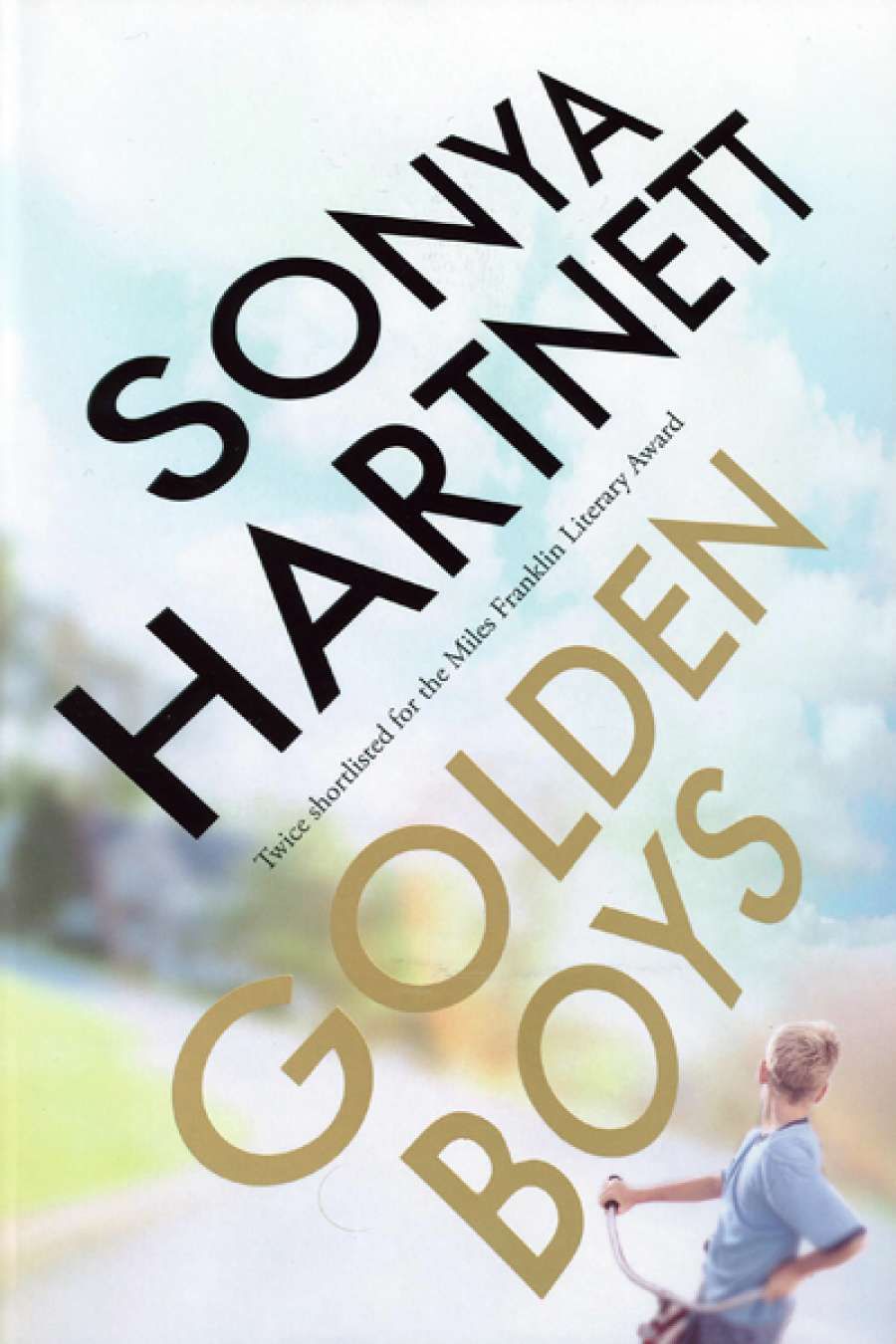
- Free Article: No
- Contents Category: Fiction
- Review Article: Yes
- Article Title: Bearing Witness
- Online Only: No
- Custom Highlight Text:
Sonya Hartnett writes for all ages, her work spanning children’s picture books to novels for young adults and adult readers. Her adult novels have been widely acclaimed; Of a Boy (2002) won the Age Book of the Year award and has been canonised as a Penguin Classic. In many ways, though, her pedigree as a much-awarded children’s writer has always characterised her career.
- Book 1 Title: Golden Boys
- Book 1 Biblio: Penguin, $29.99 pb, 238 pp

Golden Boys is beautifully structured; it is a pleasure to note its easy craftsmanship, from the disquieting, theme-defining opening sentence onwards: ‘With their father, there’s always a catch: the truth is enough to make Colt take a step back.’ The novel is narrated by a handful of neighbourhood children who are part of the ecosystem of this familiar suburban world. The two central narrators are teenagers on the cusp of puberty (‘creature[s] of change’), just beginning to question the way things are in the world and within their own families.
Colt Jenson’s family are exotic transplants from a more moneyed suburb; their very presence is strange. ‘Maybe they’re hiding,’ comments a neighbourhood child in the opening pages, casually pinpointing the truth. Colt sketches out overheard conversations in the night, a quick exit, best friends he knows he will never see again. He is both realising and resisting what he knows deep down about his father, a man who ‘spends money not merely on making his sons envied, but on making them … enticing’.
Freya Kiley is the oldest of six siblings in a working-class Catholic family. They are not poor, but ‘everything a child might want is inevitably deemed too expensive to be purchased on a whim’. Hartnett paints this bland almost-poverty in poignant, ordinary details: the Thursday shopping nights where treats are hoped for, but rarely delivered, the neopolitan ice-cream container in the freezer where the chocolate and strawberry have been eaten away, leaving an unappetising vanilla wedge. The juxtaposition of the Jensons’ profligate luxuries against this setting perfectly illustrates their potent allure.
There is a secret at the Kiley house, too: father Joe drinks to excess and takes out his disappointments on his family. Most of the time, he is an absence more than a presence in their lives, while Rex Jenson is too present, ingratiating himself in his sons’ lives and inserting himself into their social groups.
Hartnett builds Colt’s and Freya’s disillusionment with their once-worshipped fathers in tandem, as they steel themselves to see what the adults in their lives have decided not to about these very different suburban monsters. The two men, who instinctively dislike each other, are given information about the other’s misdeeds as the book escalates, beautifully building the tension as to what they will do with that information.
This novel is concerned with types of danger and power, and with the codes we construct that allow us to coexist. This is played out in the adult world (as glimpsed by the children – we never tap directly into an adult perspective) and in the parallel society of children, with its own alliances, authority figures, and underdogs. It seems no accident that we first meet Freya in church, where her rejection of authority begins, along with the conclusion that the local priest is ‘just a human’, setting the scene for the toppling of the neighbourhood fathers from their pedestals.
 Sonya Hartnett (courtesy of RedFive Studios)
Sonya Hartnett (courtesy of RedFive Studios)
A question widely asked following revelations of child abuse in the Catholic Church, and among a cabal of celebrities in Britain, was: how did this happen? Somany people knew or suspected but said nothing – dismissed it as too challenging to confront or expose. In Golden Boys, Hartnett brilliantly shows exactly how such things can happen, and how codes of silence like the one that reigns over this very average neighbourhood are inculcated in subsequent generations. Each family keeps to itself, pretending not to see neglect or abuse, for fear, it seems, of impoliteness as much as their own exposure. It is the children who voice indignation about the treatment of their peers, including the neglect of local wild child Avery (who resembles a more confident version of Of a Boy’s Adrian), while the adults downplay it as simply part of life.
It seems fitting that a children’s writer has chosen to tackle the subject of paedophilia; Hartnett contributes a sophisticated understanding of how children might be drawn in, as well as the role of silence in allowing various kinds of suburban violence to endure. She sublimely evokes a mood of ordinary dread throughout, blending everyday details with macabre imagery: ‘The filling of the swimming pool attracts them like flies.’ This is an absorbing, fiercely elegant and tangibly believable novel that raises questions about our responsibility to bear witness – and details the complex obstacles to doing so.


Comments powered by CComment